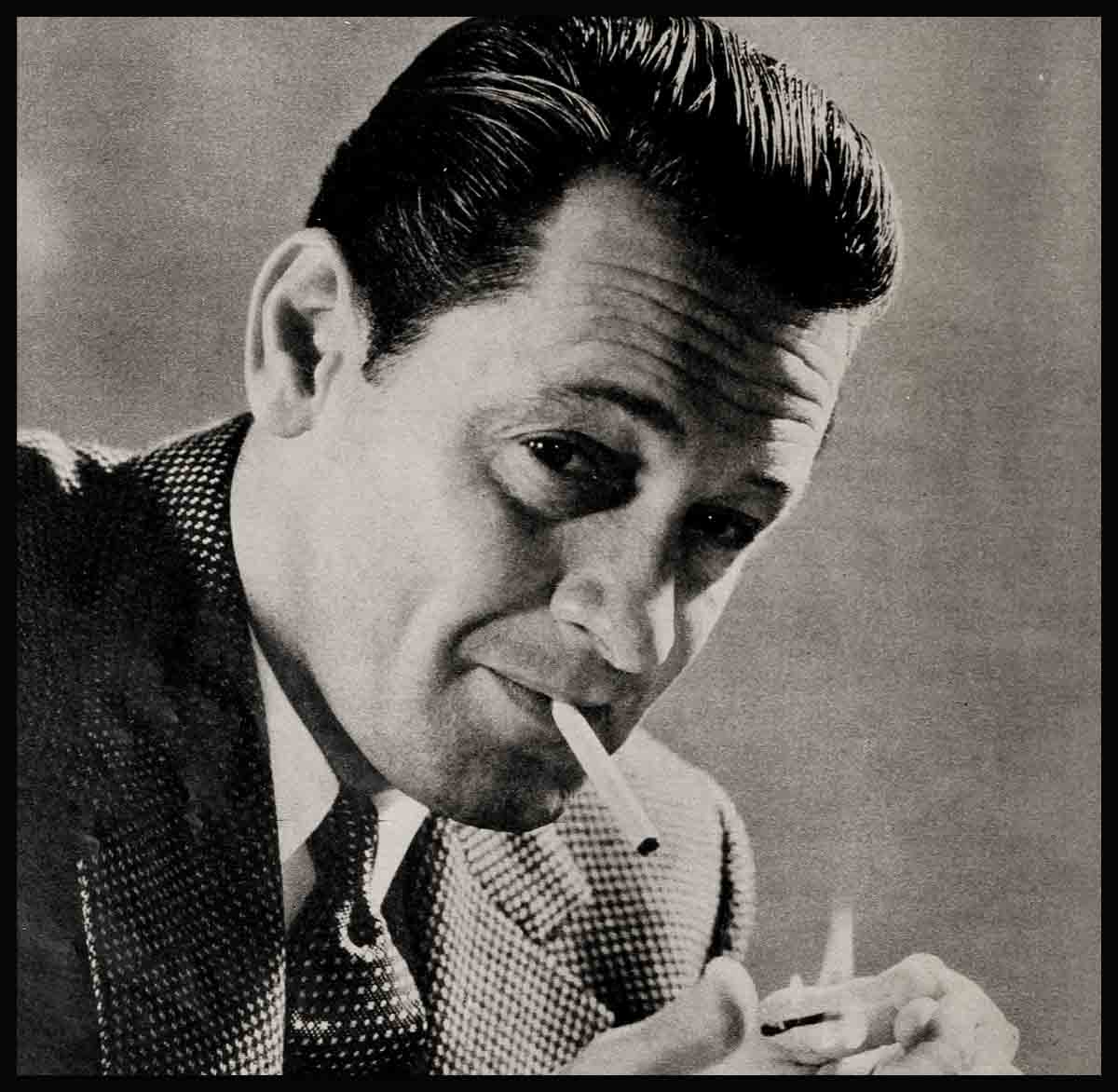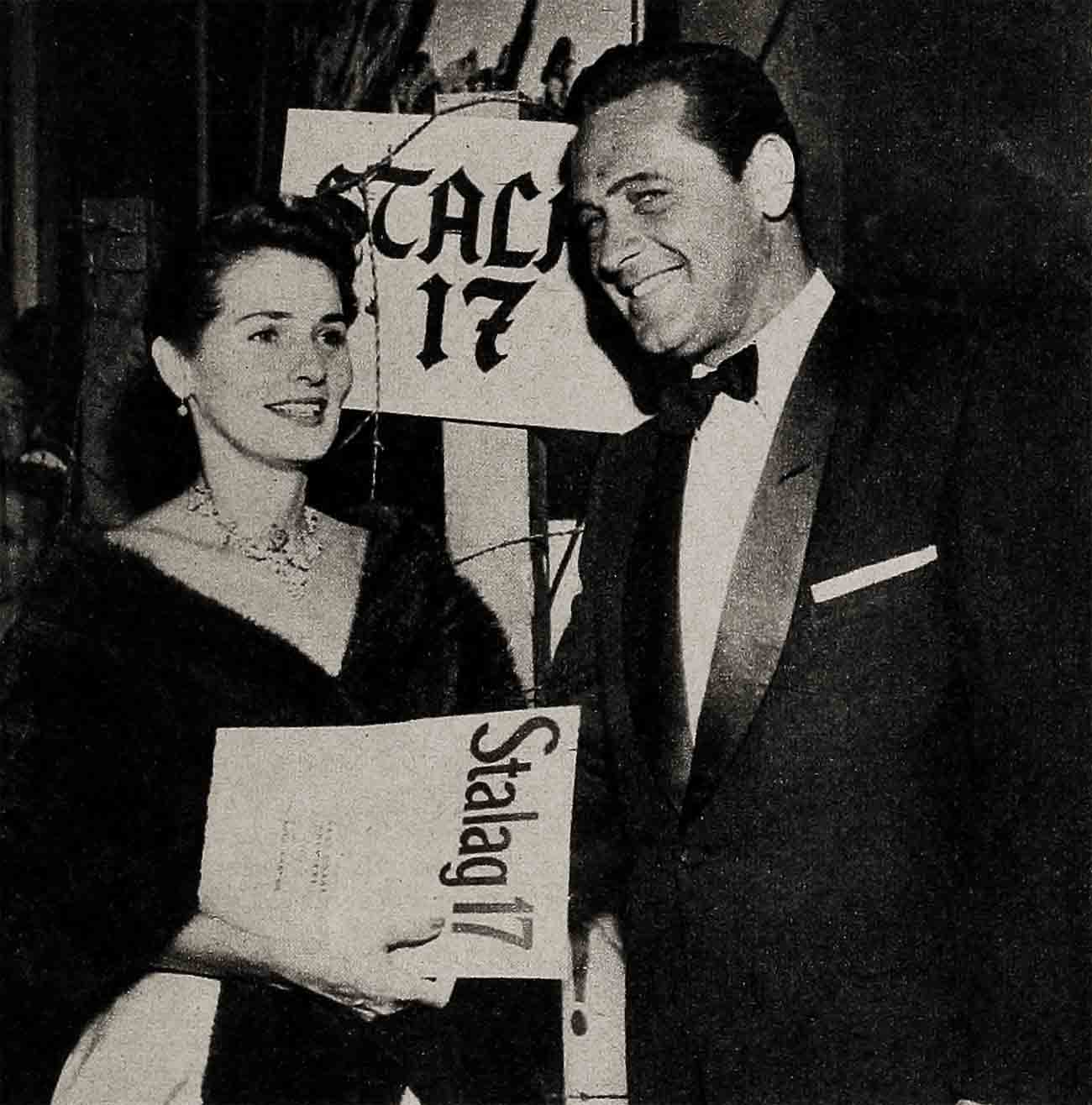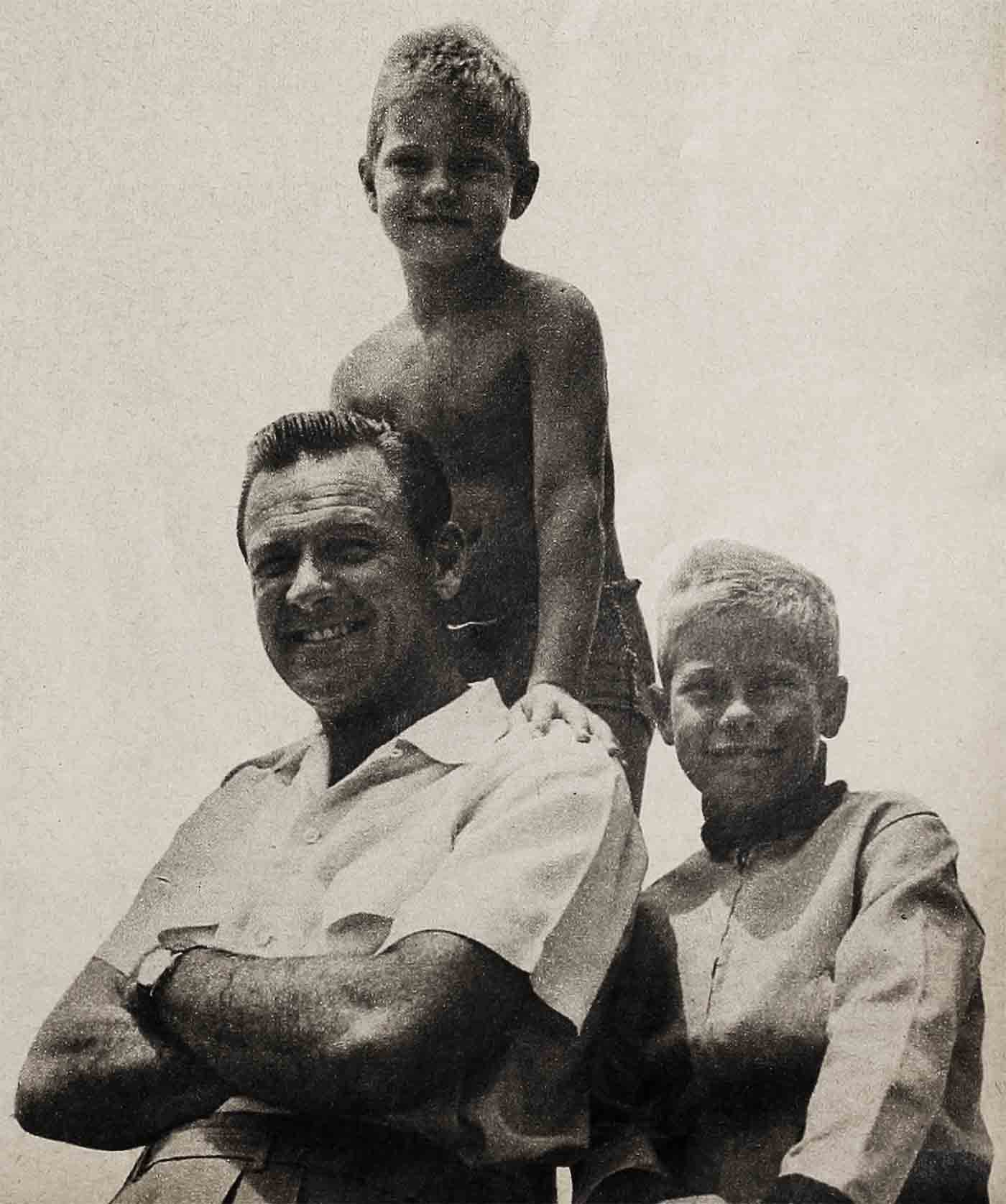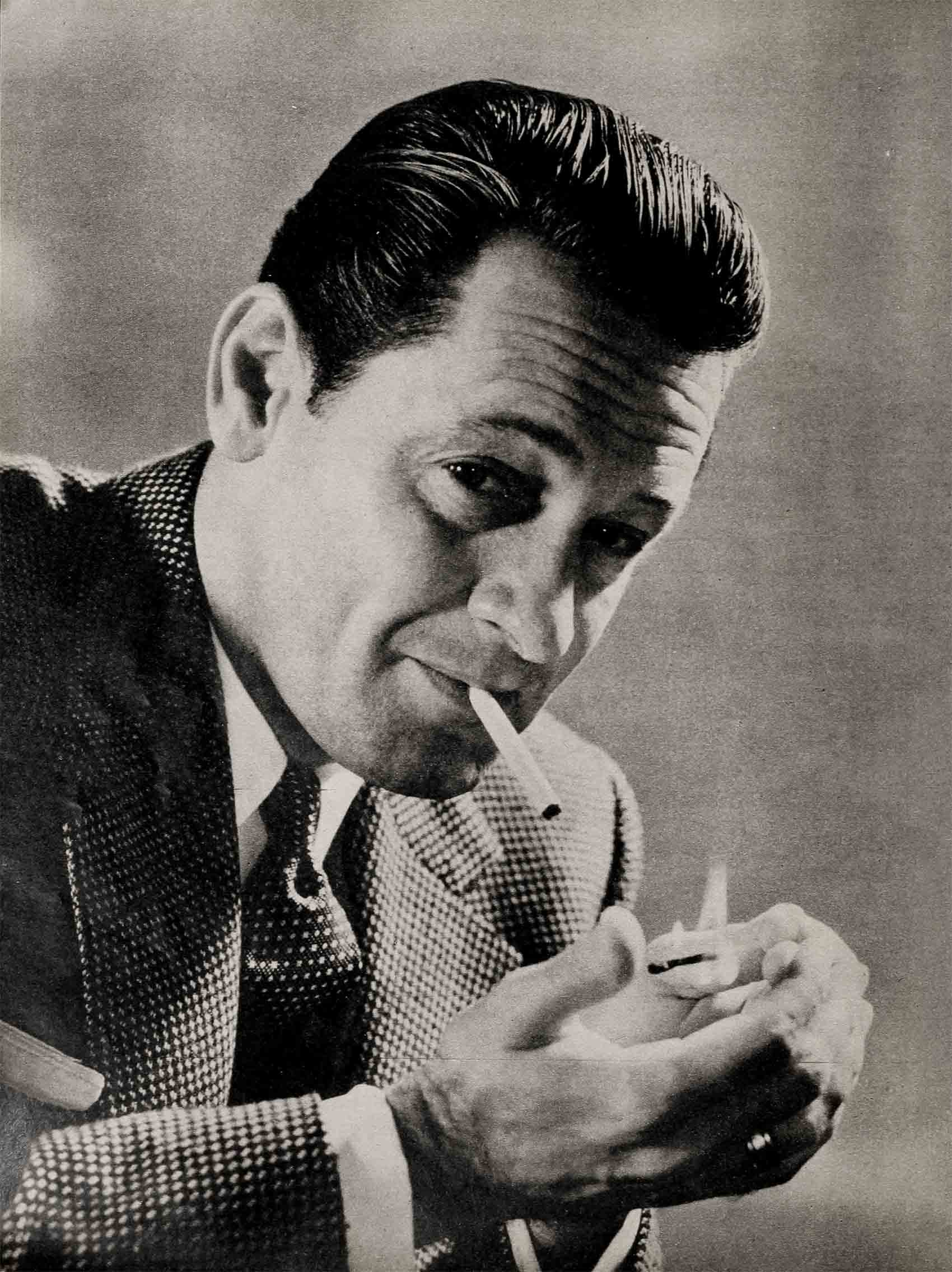
If You Knew Beedle—William Holden
“I guess I’m the most accident-prone guy in this entire country. I can sense when something’s going to happen, especially to me.” Bill Holden was explaining that things do happen to him, although they’re not for headlines.
“One night a few years ago, when we had just bought a new car, Ardis and I decided to go to a movie.” Bill is married to Brenda Marshall whose real name is Ardis Ankerson.
“I had a feeling that something would happen to the car, so I asked the parking lot attendant to let me park it myself. I left it a good distance away from any of the other cars.
“During the movie, I began to fidget.
“ ‘What’s the matter?’ Ardis asked.
“ ‘I’m worried about the car,’ I answered.
“ ‘Don’t be foolish,’ Ardis muttered.
“Sure enough when we got back to the car, the front right fender was completely smashed in.
“Only recently, on the night of the Academy Awards, I had that feeling again. I felt something was going to happen to the new Cadillac. And on the way home it did. Banged into a pole.”
An actor who once flew to New York with Holden insists that Bill is psychic.
“He’s in the wrong profession,” Leon Ames insists. “He should be a fortune-teller. On this particular flight Bill predicted that the hostess would upset a tray of coffee cups on his lap. I told him he was nuts.
“The very first time the hostess came down the aisle loaded with coffee the plane dipped. You guessed it—everything landed on Holden.”
Ronnie Reagan, one of Bill’s closest friends, tells about the time Bill was invited to talk at a Friars Club dinner.
“He decided to talk about his unhappy experience with the airline hostess,” Ronnie recalls, “when amazingly enough, a waiter carrying a load of chocolate sundaes suddenly stumbled, and Bill found his suit full of syrup and ice cream.”
Bill’s wife says that very early in their marriage she learned that Bill was accident-happy. It started with the wedding. “We decided to get married over a weekend in Las Vegas. Bill was working at the time and said that as soon as he was finished, he and Brian Donlevy, his best man, would charter a plane and fly in.
“He had made arrangements with the Congregational minister and hired the bridal suite at El Rancho Vegas. We were to be married at ten P.M. in the chapel.
“At ten P.M. there were no signs of Bill or the best man.
“They had chartered a plane and had made an emergency landing in a mud flat some place. They finally reached Las Vegas at three A.M. By that time the minister was fast asleep and the hotel had rented our suite to someone else.
“We got another room and called the minister. He was a very sweet man. He came over and married us at four A.M. And then we had a champagne breakfast.
“The pilot then suggested that we’d better get going if we wanted to beat the fog back into Los Angeles.

“So Monday, the next day, Bill went back to work at Columbia, and I took off for a location trip to Canada.
“The day I got back, looking forward to our delayed honeymoon, Bill went on location to Carson City. Two weeks later he came down with appendicitis and went to the Cedars of Lebanon Hospital.
“The day before Bill was to be released, I came down with an emergency case of appendicitis, and they had to put me in the hospital. So you can see what happened to our honeymoon.”
Bill Holden has been close-mouthed with. magazines, another reason why his fans don’t know too much about him.
Bill isn’t exactly uncooperative. He is chary because some writers almost cost him his career before it began.
Bill’s father, head chemist of the George W. Gooch Laboratories, wanted Bill to major in chemistry at school.
Bill didn’t like chemistry. He used to spend summers in the lab analyzing the constituents of fertilizer. He decided when he was eighteen that this was not for him.
At Pasadena Junior College he took a course in dramatics. He played the role of Madame Curie’s eighty-year-old father in the Playbox Theatre, then under the supervision of the Pasadena Playhouse.
A Paramount talent scout saw Bill in his role and offered him a screen test. Nobody thought the test was sensational, but Bill was signed for $50 a week, “because he’s a nice clean-cut young man who looks like the boy next door.”
In 1938, Columbia Pictures was conducting a nation-wide search for a Golden Boy to play opposite Barbara Stanwyck in the picture of the same name. More than 5,000 contestants had been interviewed before Paramount decided to let Columbia look at Holden’s screen test. Columbia agreed to give Bill the role if Paramount would split his contract. Paramount agreed.
According to a close friend of Holden’s, “This was when the fan magazines began to drive him crazy.
“Every single day at least half a dozen writers would interview the poor guy. ‘How does it feel being a boy Cinderella? Do you sleep in the raw or in pajamas? What are you doing with all your money? Do you consider yourself the luckiest boy in the world?’
“If you remember Golden Boy, Bill had to play the part of a kid who was half violinist and half prizefighter. It-was his first role, and he was scared silly. The studio assigned Cannonball Green to teach him how to box. A music teacher taught him how to finger the violin. A voice coach taught him how to speak. The make-up department curled his hair each morning. The kid was going nuts.

“In between, he had to memorize his lines. On top of all this, he had to sit for interviews. He was bewildered. After a month of this routine at fifty bucks a week, he just couldn’t take it.
“ ‘I quit, he announced. That’s when Barbara Stanwyck stepped in. She’s the baby who saved him.”
Barbara recalls, “I simply put my foot down and ordered the set closed. Like all beginners, Bill was a little unsure of himself, and I did my best to keep him relaxed and self-confident.”
Barbara did more than that. She insisted that Bill be given the best camera angles, that his part be built up, that he be left some time to study his lines.
Bill has never forgotten Barbara’s kindness. Each year on the anniversary, of Golden Boy, he sends her a tremendous bouquet of roses.
“If I’m anything in this business,” he says modestly. “I owe it to Barbara and a few other fine people who took pains to teach me.”
Bill also insists, “I have absolutely nothing against any magazine or any type of magazine. I just don’t have time to be autobiographical.”
Bill is not only short on time, he is short on inclination. He just doesn’t like to talk about some things.
His brother Bob, for example. Bill and his kid brother were inseparable all through their youth in O’Fallon, Illinois, where they were born and in Monrovia and South Pasadena where they were brought up.
As a youngster Bill owned a motorcycle and was something of a daredevil. He used to take bets that he could stand on his motorcycle and balance himself while the machine rode down the highway.
His mother, a former teacher, was outraged by this stunt and absolutely forbade it. She told Bob to notify her whenever Bill pulled one of his crazy stunts. But Bob, who was four years younger than Bill, worshipped his big brother. He never told on him. And Bill in turn loved and protected his little brother.

In World War II, Bill volunteered for the Army Air Force and Bob for the Navy Air Force. Bill was stationed in Texas and California, and Bob went to the Pacific on the aircraft carrier Bunker Hill.
In Fort Worth, Texas, Bill lived off the base, and his roommate was Hank Greenberg, the Detroit baseball star.
A series of robberies had occurred in their neighborhood, so Lieutenant Holden was sleeping with his .45 under the pillow.
One night Greenberg, supposedly on leave, returned earlier than expected. He started to tiptoe into the room. Holden heard the footsteps, reached under his pillow for the revolver, and whirled toward the door. When he saw it was Hank, he slipped the gun back under the pillow.
“I never told Hank,” Bill says, “how close he came to death at an early age.”
On January 4, 1944, Ensign Robert Beedle was killed in combat on a mission over Kavieng, New Ireland.
When Bill received news of his brother’s death in the Pacific, he was naturally quite broken up. Ardis had given birth to a son two months before, and Bill had written his brother that the child would be named Peter Westfield in honor of Bob, whose middle name was Westfield.
Although many actors talk constantly about their own emotions, Bill cannot. He could give no tongue to his sorrow about Bob, and he finds it difficult to talk about his deep love for Ardis and the children.
Even in matters that don’t touch him so deeply, Bill is less than garrulous.
When he won his first Academy Award for his superb performance in Stalag 17, he was asked how it felt. “Lucky,” he said.
“Where’d you get the name Holden?” he was asked. Bill’s real name is Beedle.
“A newspaperman,” Bill answered. “Took it from him.”
Asked to describe his courtship of Ardis, Bill’s answer is usually something like. “Who cares about that?”
A studio publicity agent, once assigned to Holden, used to ask him for news every few days. Bill would always smile and shrug his shoulders to signify that there was nothing new—whereupon the publicity agent began to call him “the mystery man.”
Bill is by nature unassuming, modest and unobtrusive, so unobtrusive in fact, that in 1951 after he had been in the movies thirteen years and had made some thirty films, the theatre-owners of America voted him their second choice as “star of tomorrow!”
Billy Wilder, who directed Holden in Sunset Boulevard and Stalag, has a ready explanation for Bill’s sedateness.
“He is interested in his performance,” Wilder points out. “Not his publicity.”
Another reason relatively little is known of Bill’s personality is that he has never lived any of his life in the headlines.
“Things happen to me all right,” Bill says, “but since they’re never tinged with scandal, thank the Lord, they never make the papers.”
Bill married the only girl ever linked with him in the gossip columns. He never took out many girls in Hollywood. Never had the time. Never had the dough.
In 1939 after he made a hit in Golden Boy, he took a house in the Hollywood Hills with Hugh McMullan, the dialogue director on the picture.
Hugh offered to get Bill a date with Brenda Marshall, a girl he had known in New York who was then under contract to Warner Brothers.
“Are you crazy?” Bill asked. “She’s married.”
“She’s separated, ” Hugh explained. “And besides she’s a really wonderful girl.”
“Skip it,” Holden said. “I’ll stay home and read a book.”
A few weeks later Bill was loaned out to Warner Brothers to co-star with George Raft in Invisible Stripes. Second day on the lot he ran into Brenda Marshall.
“Hugh McMullan,” he began. “He’s a That is, we live together. And we were wondering—well.”
“Yes,” Brenda helped out, “you were wondering what?”
“We were wondering,” Bill asked, “if you’d care to take dinner with us one night.”
“I’d be delighted,” said Brenda, who was then earning $750 a week.
That’s how it began. It moved along at a rapid pace.
Bill and Brenda fell in love. They wanted to get married immediately, but it took twenty-one months for Brenda to work twenty-one months for Brenda to ard Gaines and to obtain custody of her daughter Virginia, now sixteen.
During this time, Bill took his girl to the movies and to dine at drive-ins and the most inexpensive restaurants in town. Bill wasn’t earning much money, and. although the girl complained, he refuse “to go Dutch on our dates.”
The Holdens were finally married on July 13, 1941, and nine months. later Bill volunteered and was assigned to the Air Force Training Command. He remained in the service four years, but he was able to see Ardis on furloughs. She agreed to retire when the war was over and Bill had re-established himself.
Seven years ago when Ardis gave birth to a second son, Bill, whose contract was still split between Columbia and Paramount, started asking for better roles.
“If I can’t get them around here,” he pleaded, “please loan me out.”
That’s exactly what the studios did. They sent Bill over to RKO for Rachel And The Stranger, to 20th Century for Apartment For Peggy, and then they began to realize that their boy-from-next-door had developed into quite an actor.
Bill was given a lead in Sunset Boulevard, nominated for an Academy Award, the lead in Born Yesterday,which won the Academy Award for Judy Holliday, and then two years ago, Paramount offered him a fourteen-year contract and the right to make one outside picture a year.
Bill hopes to set up his own independent company for these outside pictures and to make the first one with Audrey Hepburn, with whom he co-starred in Sabrina.
Bill Holden is popular with his fellow-actors, high praise in Hollywood. He has been elected vice president of the Screen Actors Guild, and whenever the group wants someone to speak for them, the honor falls to Holden.
Bill owns a large collection of guns, but when he goes hunting with Brian Donlevy or Richard Carlson he comes back empty-handed, although he’s a crack shot.
Brian Donlevy likes to tell about the time he and Bill went hunting for coyotes.
“I explained to Holden,” Donlevy says, “that the best way to shoot coyotes was first to shoot a wild burro. We’d stake out the burro. Then when the coyotes came to scavenge, we’d let ’em have it.
“Bill agreed and we took off for Death Valley one weekend. You wanna know something? We must’ve seen at least a half dozen wild burros. Only Holden didn’t have the heart to shoot one of ’em!”
“Neither did Donlevy,” ‘Bill said later. “He should talk!”
Most Hollywood actors wandered onto the scene by accident. Not Bill. Besides his Air Force duty, acting is the only profession he’s ever known—and he loves to work. Because of that he gets more work than he can handle. In the last-two years he has made Turning Point, Stalag 17, Escape From Ft. Bravo, Forever Female, The Moon Is Blue, Executive Suite, The Bridges At Toko-Ri, Sabrina and Country Girl. No wonder he was tired the night he won his Academy Award.
He had worked all that day with Bing Crosby and Grace Kelly on Country Girl, and he just made it to the Academy Theatre. When he and Ardis got home that night, Bill flopped into an easy chair. Ardis covered her husband with a blanket, and Bill slept the whole night sitting up.
In the morning he was awakened by children’s voices. He looked around and a bunch of neighborhood kids were in the room with him. Peter Holden, ten, was showing off the Oscar.
“See this?” he asked proudly. “My dad got it for being good.”
Bill smiled, drew the blanket over his head, and closed his eyes, sleeping the sleep of those fortunate few who are blessed with accomplishment, love and peace of mind.
THE END
—BY STEVE CRONIN
It is a quote. MODERN SCREEN MAGAZINE JULY 1954





No Comments